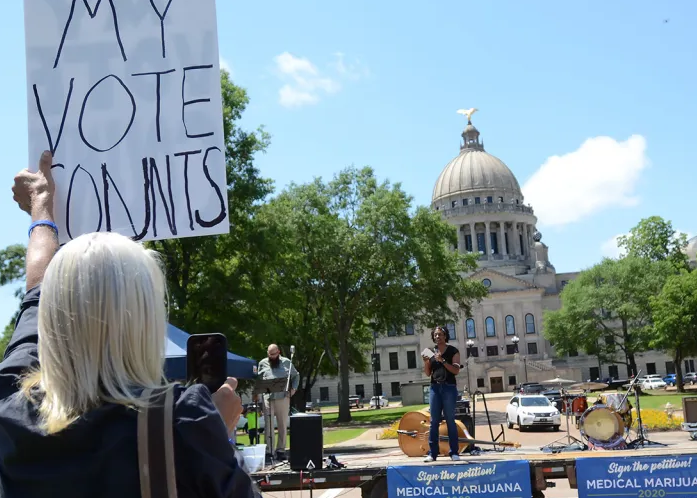In a bold push that could shatter Massachusetts’ booming $1.6 billion recreational marijuana market, state officials have greenlit ballot measures aiming to recriminalize adult-use sales by 2026. This surprising twist has cannabis advocates scrambling, as voters might soon decide the fate of an industry that’s thrived since 2016. What drives this effort, and could it really succeed?
The Push to Roll Back Legal Weed
Massachusetts Attorney General Andrea Joy Campbell certified two similar ballot initiatives on September 3, paving the way for a potential voter showdown in 2026. These measures would end licensed adult-use cannabis sales across the state, effectively dismantling a market that generated $1.6 billion in revenue last year. The proposals come from political consultant Caroline Cunningham, who filed the petitions under the title “An Act to Restore a Sensible Marijuana Policy.”
If approved by voters, the changes would repeal key parts of the 2016 law that legalized recreational marijuana. That original ballot question passed with 54% support, leading to sales starting in 2018. Now, backers of the new initiatives argue it’s time to reverse course, citing concerns over public health and safety.
The petitions need 74,574 signatures from registered voters to qualify for the ballot. Organizers have a tight deadline to gather them, with the first batch due by early December. Supporters must act fast in a state where legalization remains popular, according to recent polls.
Campaigns like this aren’t new, but this one stands out for targeting a well-established industry. Massachusetts has over 300 licensed dispensaries, employing thousands and contributing millions in taxes.

What the Measures Would Change
Under the proposed rules, adults 21 and older could still possess up to 1 ounce of marijuana or 5 grams of concentrates. Gifting small amounts to other adults would be allowed, as long as it’s not advertised publicly. Medical marijuana programs would stay intact, protecting patients who rely on cannabis for treatment.
However, the initiatives would wipe out commercial cultivation and retail operations for recreational use. Home growing, currently permitted for personal use, would also face restrictions or bans in some versions of the petitions.
This setup creates a gray area. Possession stays legal, but buying or selling recreationally becomes a crime again. Critics say it could fuel black market activity, undoing years of regulated progress.
Supporters point to issues like increased youth access and impaired driving as reasons for change. A 2023 study by the Massachusetts Department of Public Health showed a slight uptick in cannabis-related emergency room visits since legalization, though experts debate the causes.
The economic hit could be massive. The state’s Cannabis Control Commission reported $1.6 billion in adult-use sales for 2023 alone, with taxes funding schools and public services.
Backstory of Marijuana in Massachusetts
Massachusetts joined the legal weed wave in 2016 when voters approved Question 4, making it one of the first East Coast states to allow recreational use. Sales kicked off two years later, after regulators ironed out rules.
The industry has grown steadily, with over 100,000 jobs created nationwide in legal cannabis, according to a 2024 report from Leafly, a cannabis data firm. In Massachusetts, it’s become a key economic driver, especially in rural areas where dispensaries boost local tourism.
But opposition has simmered. Groups worried about addiction and community impacts have pushed back. Caroline Cunningham, the petition filer, has ties to conservative causes, though she frames this as a “common-sense” reform.
Nationally, 24 states have legalized recreational marijuana as of 2024, per the National Conference of State Legislatures. Yet, no state has fully reversed legalization once it took hold, making this bid historic if it advances.
Voters rejected a similar psychedelics measure in 2024, showing ballot initiatives can fail even in progressive Massachusetts.
Potential Impacts on People and Economy
If these measures pass, everyday users might face higher costs and risks from unregulated sources. Business owners could lose everything, with dispensaries forced to shut down or pivot to medical-only sales.
Take the employment side: A 2024 analysis by the U.S. Bureau of Labor Statistics estimates cannabis supports 428,000 jobs across America. In Massachusetts, thousands could be at stake, hitting workers in cultivation, retail, and supply chains.
Taxes are another big piece. The state collected over $200 million from cannabis excise taxes in 2023, funding drug prevention and infrastructure. Losing that revenue might strain budgets.
On the flip side, proponents claim savings from reduced enforcement and health costs. They reference a 2022 study by the Centers for Disease Control and Prevention linking legalization to higher teen usage rates in some areas.
Here’s how the changes could play out:
- Possession Limits: 1 ounce max for flower, 5 grams for concentrates – no jail for small amounts.
- Gifting Rules: Allowed privately, but no public promotion.
- Medical Access: Fully protected, with no disruptions.
- Home Growing: Likely banned or severely limited.
This structure aims to decriminalize personal use while targeting commercial aspects.
Challenges Ahead for the Campaign
Gathering signatures is just the start. Organizers must submit them to local clerks by November, then to the state by December. If they hit the mark, the measures go before voters in 2026.
Opposition is already mobilizing. Cannabis trade groups like the Massachusetts Cannabis Coalition vow to fight back, highlighting job losses and consumer safety.
Public opinion might be the decider. A 2023 poll by the University of Massachusetts Amherst found 62% of residents support keeping legalization as is. But economic worries or safety fears could sway swing voters.
Legal hurdles loom too. Any ballot question must pass constitutional muster, and past initiatives have faced court challenges.
This effort reflects broader national debates. With federal rescheduling of marijuana underway in 2024, states like Massachusetts are at a crossroads.
